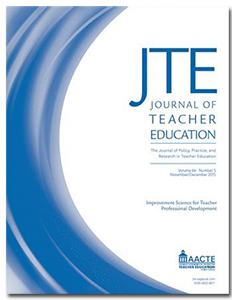JTE Author Interview: How Preservice Teachers Learn to Plan Intellectually Challenging Tasks

Have you seen the JTE Insider blog managed by the Journal of Teacher Education (JTE) editorial team? Check out the latest author interview below.
This interview features insights from the JTE article “Preservice Teachers’ Learning to Plan Intellectually Challenging Tasks,” by Hosun Kang, assistant professor of education at University of California, Irvine. The article appears in the January/February 2017 issue of JTE.
The article’s abstract reads in part, “This study explores how and under which conditions preservice secondary science teachers (PSTs) engage in effective planning practices that incorporate intellectually challenging tasks into lessons. Drawing upon a situative perspective on learning, eight PSTs’ trajectories of participation in communities of practice are examined with a focus on planning throughout student teaching. […] The analyses show that instructional tasks observed at the beginning of lessons link to the ways in which PSTs engage in the three interrelated processes of (a) framing instructional goals, (b) constructing a lesson scenario, and (c) addressing problems of practice.”
Q: What motivated you to pursue this particular research topic?
A: The topic of this study is preservice teachers’ planning and enactment of instructional tasks. The focus on preservice teacher learning in my research program has to do with my personal experiences as a classroom teacher. My experiences taught me that a teacher is the key actor who can make a real difference in students’ science learning experiences through the public education system. At the same time, I found that too many early-career teachers, including myself, were not adequately prepared to do this important work, which drove me to focus on early-career teacher learning.
The specific focus on planning of instructional tasks in this paper actually emerged from the data themselves. I documented various activities and practices that novices experiment with at their field sites as the student of teaching. I noticed that planning and enacting tasks was one central activity of learning to teach. It is also the key aspect of practices that shape students’ opportunities to learn in science classrooms. Therefore, I decided to focus on preservice teachers’ planning and enactment of instructional tasks to examine how novices learn to teach across settings and over time.
Q: Were there any specific external events (political, social, economic) that influenced your decision to engage in this research study?
A: One event that influenced the framing of the idea was the implementation of the Next Generation Science Standards. The new standards increased the expectation on student learning, centralizing complex reasoning, and problem-solving. It is unclear, however, what that means in terms of teachers’ instructional practices and how to prepare novices to promote complex learning. Therefore, by framing this paper to focus on the type and nature of intellectual work built into planned tasks, I intended to contribute to the broader conversation around how to transform the conventional teaching practices.
Q: What were some difficulties you encountered with the research?
A: One difficulty that I had was figuring out how to frame this study. I knew I was studying preservice teacher learning. I have collected extensive observational and interview data with preservice teachers, mentor teachers, and course instructors. When it comes to writing a journal article, I learned that I have to figure out one specific idea that is significant and that I have to have appropriate and sufficient evidence.
Q: Writing, by necessity, requires leaving certain things on the cutting room floor. What didn’t make it into the article that you want to talk about?
A: One idea that I had to leave behind was the development of novice teachers’ sense of self in relation to their relationship and interactions with others, and how it shapes novices’ classroom practices. I hope to communicate this idea with the next paper.
Q: What current areas of research are you pursuing?
A: My current research focuses on unpacking what it means to prepare novice science teachers for the students from the families and communities who have limited access to resources, power, and privilege. My ultimate goal is to provide some insights into the ways in which preparatory experiences can productively influence novices’ instructional practices when they become the teacher of the students who have been historically marginalized at schools.
Q: What new challenges do you see for the field of teacher education?
A: I believe the new challenge facing the field of teacher education, specifically in the United States, is preparing teachers for the students from non-White, multilingual, and low-income family backgrounds in a noninclusive political situation.
Q: What advice would you give to new scholars in teacher education?
A: There are so many unanswered questions in the field of teacher education. But asking good questions in a way that advances the field is no easy task. I would encourage new scholars to actively seek out help from senior scholars and ask questions.






